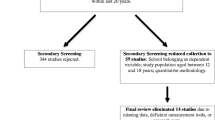Abstract
This study, conducted in Korean classrooms, investigated kindergarten children's reasoning during group moral discussions of problematic situations. The children were presented with pictures depicting problem situations distributed by the Korean Ministry of Education and were invited to: (a) reason about others' perspectives, (b) grasp the causes of the problems, and (c) seek ways to solve the problems. The study's findings suggest that young children be provided with more opportunities to engage in discussions of problem situations. Additionally, the researcher recommends further study of moral reasoning processes in preschoolers.
Similar content being viewed by others
REFERENCES
Berk, E. L. (2000). Child development. Boston: Allyn & Bacon.
Berk, E. L., & Winsler, A. (1995). Scaffolding children's learning: Vygotsky and early childhood education. Washington, DC: National Association for the Education of Young Children.
Borke, H. (1971). Interpersonal perception of young children: Egocentrism or empathy? Developmental Psychology, 38, 469–479.
Bruner, J. S. (1996). The culture of education. Cambridge, MA: Harvard University Press.
Damon, W. (1977). Social world of the child. San Francisco: Jossey-Bass.
DeVries, R., & Zan, B. S. (1994). Moral classroom, moral children. New York: Teachers College Press.
Donaldson, M. (1979). Children's minds. New York: W. W. Norton & Company.
Dunn, J., Brown, J., Slomkowski, C., Tesla, C., & Youngblade, L. (1991). Young children's understanding of other people's feelings and beliefs: Individual differences and their antecedents. Child Development, 62, 1352–1366.
Erickson, F. (1973). What makes school ethnography ethnographic? Anthropology and Education Quarterly, 4(2), 10–19.
Flavell, J. H. (1985). Cognitive development. Englewood Cliffs, NJ: Prentice Hall.
Gelman, R. (1979). Preschool thought. American Psychologist, 34, 900–905.
Graue, M. E., & Walsh, E. J. (1998). Studying children in context: Theories, methods, and ethics. Thousand Oaks, CA: Sage.
Hatano, G., & Inagaki, K. (1998). Cultural contexts of schooling revisited: A review of the learning gap from a cultural psychology perspective. In S. G. Paris & H. M. Wellman (Eds.), Global prospects for education: Development, culture, and schooling (pp. 79–104). Washington, DC: American Psychological Association.
Kohlberg, L. (1981). The philosophy of moral development. New York: Harper & Row.
Korean Ministry of Education (1996). Resource for promoting young children's morality, Seoul, Korea: Korean Ministry of Education. (in Korean)
Korean Ministry of Education (1998). Kindergarten curriculum, 1998–10, Seoul, Korea: Korean Ministry of Education. (in Korean)
Lee, D. (1985). Trivial etiquette. (Kim, G., Trans.). Seoul, Korea: Myungmoondang. (Original work published 1775) (in Korean)
Lee, G. (1994). Korean traditional idea of education and traditional home education. In G. Lee, G. Shon, & H. Lee (Eds.), Korean Traditional idea of home education (pp. 195–275). Seoungnam, Korea: Korean Institute of Minds and Culture. (in Korean)
Lee, Y. (1998). Moral education. In Research Institute of Education in Seoul National University (Eds.), The encyclopedia of education (pp. 1045–1048). Seoul, Korea: Howdonsul. (in Korean)
Miller, P. (1998, February). The cultural psychology of development: One mind, many mentalities. Paper presented at the Social Development Consortium, University of Illinois at Urbana-Champaign. IL.
Perner, J. (1991). Understanding the representational mind. Cambridge, MA: MIT Press.
Piaget, J. (1932). The moral judgment of the child. London: Routledge and Kegan Paul.
Shweder, R. A., Goodnow, J., Hatano, G., LeVine, R. A., Markus, H., & Miller, P. (1998). The cultural psychology of development: One mind, many mentalities. In W. Damon (Ed.), Handbook of child psychology: Vol. 1. Theoretical models of human development (pp. 865–937). New York: John Wiley & Sons.
Vygotsky, L. (1978). Mind in society: The development of psychological processes. Cambridge, MA: Harvard University.
Walsh, J. D. (1992). Implications of a post-Piagetian perspective for early childhood education: Helping children make sense. Invited paper: Taipei Municipal Early Childhood Education. Taipei, Taiwan.
Wellman, H. (1990). The child's theory of mind. Cambridge, MA: MIT Press.
Author information
Authors and Affiliations
Rights and permissions
About this article
Cite this article
Hong, Y. An Ethnographic Study of Korean Kindergartners' Reasoning During Group Moral Discussions. Early Childhood Education Journal 30, 151–156 (2003). https://doi.org/10.1023/A:1022009804884
Issue Date:
DOI: https://doi.org/10.1023/A:1022009804884




